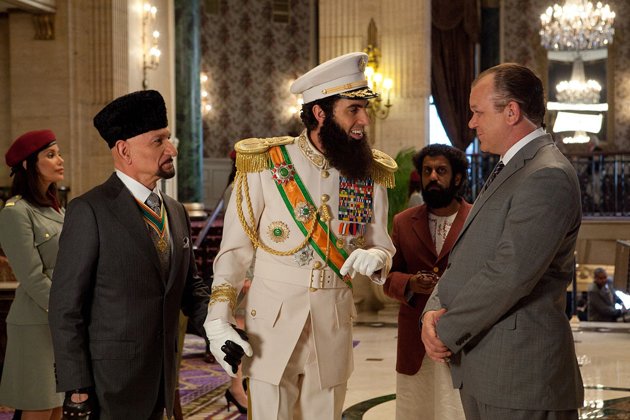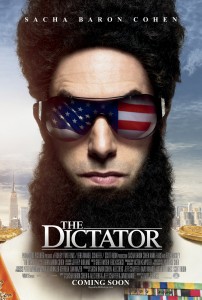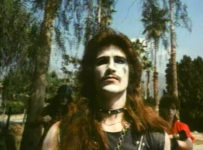It will take more than an oversized fake beard to patch up the gaping hole Sacha Baron Cohen has punched through the boundaries of taste in his latest outing.
[stextbox id=”grey” caption=”The Dictator (2012)” float=”true” align=”right” width=”200″]
Director: Larry Charles
Writer(s): Sacha Baron Cohen, Alec Berg, David Mandel, Jeff Schaffer
Runtime: 83 minutes
Starring: Sacha Baron Cohen, Anna Faris, Ben Kingsley
Distributor: Paramount
Country: US
Rating (?): Avoid Like Plague
[/stextbox]
Sacha Baron Cohen‘s singular quest to deride and belittle his targets has earned him accolades around the globe, and has become known for portraying a variety of fictional characters who set up real-world people to fall in front of the cameras. Just as Gary McDonald’s Norman Gunston satirised Australian culture and show business, Baron Cohen’s Ali G, Brüno and, most infamously, Borat set out to challenge what people thought of cultural stereotypes and expose general ignorance. Yet there is a fine line between mocking bigotry and simply being offensive.
In The Dictator, Baron Cohen portrays Admiral General Aladeen of the fictional Republic of Wadiya, said to be based loosely on Libyan leader Muammar Gaddafi. One of the most tyrannical dictators in the world’s history, he visits New York to address the United Nations. However, forgotten heir Tamir (Ben Kingsley) betrays him, replacing him with a decoy intending to bring democracy to Wadiya. Aladeen is set adrift in the Big Apple, taken in by do-gooder Zoey (Anna Faris), but is determined to ensure democracy is kept away from the country he has lovingly enslaved.
Baron Cohen’s schtick has to date been a straightforward one, employing tried-and-true candid camera techniques to catch his unsuspecting targets behaving more like themselves than they would care to admit. With The Dictator, the co-writer and star tries on a narrative structure for size. On one hand, the move shows a progression in a career that was beginning to become stagnant, with each character effectively a variation on previous incarnations, with turns in Sweeny Todd: The Demon Barber of Fleet Street and Hugo notable exceptions. However, it is not the form of the film that betrays Baron Cohen’s weaknesses, but rather the character(s) he chooses to continually portray. It also means he no longer has the excuse of using bigotry for the purpose of catching people off guard.
Stripped of his beard and identifiable accent, Aladeen is the basest of racist humans, sparing nobody in his tirades. With Borat, he played off his own Jewish heritage with the anti-Semitic character. In an interview with Rolling Stone, Baron Cohen explained “By himself being anti-Semitic, he lets people lower their guard and expose their own prejudice”. Yet nobody is spared in The Dictator, with the character of Aladeen being against women (and feminism generally), various races and religions and implicitly a parody of Arabic stereotypes. Which begs the question of who or what Baron Cohen is actually targeting in this very broad slapstick farce, except perhaps deceased North Korean dictator Kim Jong-il, to whom the film is ‘dedicated’.
There are moments when Baron Cohen’s point is almost visible, including the perception of an American couple who assume Aladeen and his colleague are terrorist. In a final speech, perhaps designed to mirror Charlie Chaplin’s seminal monologue in The Great Dictator (1940), Baron Cohen comes closest to making a point about the hypocrisy of the United States on a global scale. Yet he squanders every other chance at comedy on slapstick, and cheap shots that would have seemed dated in the days of Ayatollah t-shirts. In the end, Baron Cohen doesn’t so much hold up a mirror to bigotry, but seems to have finally become one himself, providing an easily imitable cartoon to be misused by the masses.
The Dictator is released in Australia on 16 May 2012 from Paramount.





